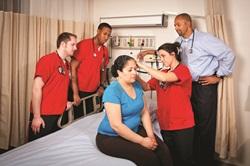Rutgers-Camden/Cooper collaborative is funded by a grant from the Robert Wood Johnson Foundation
CAMDEN — The Rutgers School of Nursing-Camden and Cooper University Health Care are partnering to encourage health care paraprofessionals from underrepresented populations to pursue nursing careers.
The Rutgers-Camden/Cooper Collaborative for Upward Mobility in Nursing will provide baccalaureate education to unlicensed, assistive personnel employed at Cooper University Health Care. It is being funded by a $250,000 grant from the Robert Wood Johnson Foundation (RWJF) through its New Jersey Health Initiatives: New Paths to Professional Nursing program.
“Through this new pipeline program, Rutgers-Camden and Cooper will collaborate to grow a diverse workforce of baccalaureate prepared, registered nurses from historically underrepresented groups that will help us better meet the health care needs of the communities we serve,” says Joanne Robinson, dean of the Rutgers School of Nursing-Camden.

The collaborative will provide a college preparatory curriculum for health care paraprofessionals who aspire to become baccalaureate nurses. Upon successful completion of the program, students will be admitted to the Rutgers School of Nursing-Camden to begin their pursuit of a bachelor’s degree in nursing.
“The collaboration between Rutgers and Cooper University Health Care, supported by funding from RWJF's New Jersey Health Initiatives program, provides an incredible opportunity for many of our skilled employees to pursue a nursing career,” says Adrienne Kirby, president and chief executive officer of Cooper University Health Care. “We are grateful to the Robert Wood Johnson Foundation for understanding the potential of this crossover program.”
During the first year of the program, the college preparatory curriculum will consist of courses in English, math and the life sciences as well as weekly seminars to build academic skills. Upon successful completion of those courses, students will take baccalaureate nursing classes during the second year of the program. Participants will work with baccalaureate nurse mentors who are currently employed by Cooper, providing workplace encouragement and support.
'Rutgers-Camden and Cooper will collaborate to grow a diverse workforce of baccalaureate prepared, registered nurses from historically underrepresented groups that will help us better meet the health care needs of the communities we serve.'– Rutgers-Camden Nursing Dean Joanne Robinson
An initial cohort of up to 10 Cooper employees with at least two years of health care work experience and who aren’t currently enrolled in a bachelor’s of nursing program will be recruited for the fall 2014 pilot program.
Unlicensed, assistive personnel at the hospital include patient care associates, critical care technicians, patient companions unit secretaries and transporters. More than 80 percent of the employees who serve Cooper in these capacities are from underrepresented populations in the health care profession and are predominantly African American and Hispanic.
“With 1,200 nurses providing the highest level of care to patients of our region, we have an incredible manifest of knowledge to share, both in the classroom and bedside,” says Stephanie Conners, senior vice president of hospital operations and chief nursing officer at Cooper.
Robinson adds, “Obtaining a bachelor’s degree is becoming essential for nurses throughout New Jersey and across the country in order to deliver on exceptional nursing care and improve patient outcomes. The Rutgers-Camden/Cooper Collaborative will help meet a critical need and improve the way health care is delivered in our region and beyond. It presents a significant opportunity to build upon and develop new models of nursing education.”
Over the two years of the program, students will receive tuition support and a stipend to cover personal expenses that can often be a barrier to seeking advanced education.
The Rutgers School of Nursing-Camden offers dynamic curricula that integrate nursing knowledge and clinical practice, including baccalaureate programs for traditional students, registered nurse students, and second-degree students; a doctor of nursing practice program; and certification in school nursing and wound ostomy continence nursing.
Cooper University Hospital, the flagship of the Cooper University Health Care, is a 600-bed, regional, tertiary academic medical center located in the heart of Camden. Cooper currently serves more than half a million patients each year.
For more than 40 years, the Robert Wood Johnson Foundation has worked to improve the health and health care of all Americans. It is striving to build a national Culture of Health that will enable all Americans to live longer, healthier lives now and for generations to come.
The New Jersey Health Initiatives: New Paths to Professional Nursing program addresses the nursing shortage by supporting the development and implementation of programs preparing health-care paraprofessionals from underrepresented communities to matriculate into baccalaureate nursing programs in the state of New Jersey by fall 2016.